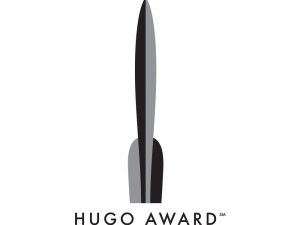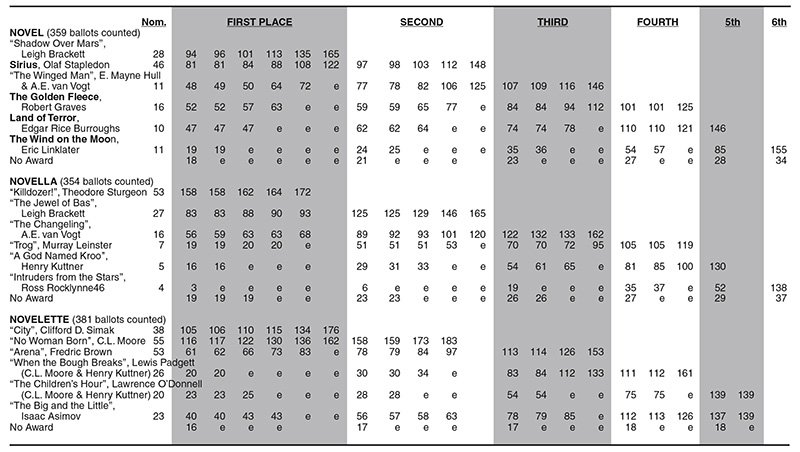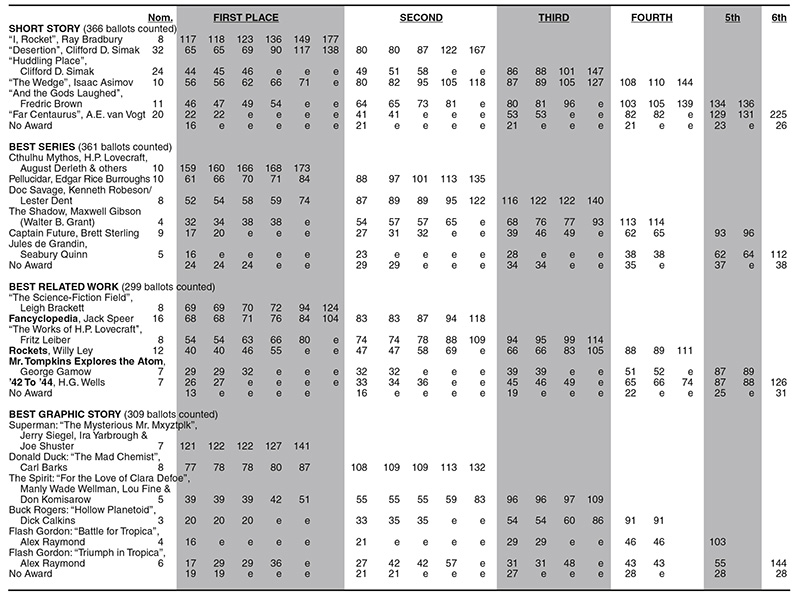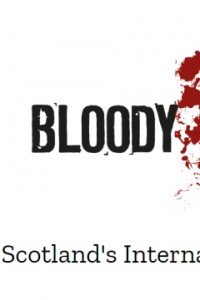Complete 1945 Retro-Hugo Voting
 CoNZealand, the 78th World Science Fiction Convention, received 521 valid ballots, down from 834 at Dublin 2019. There were 120 valid nominating ballots, down from 217.
CoNZealand, the 78th World Science Fiction Convention, received 521 valid ballots, down from 834 at Dublin 2019. There were 120 valid nominating ballots, down from 217.
A number of categories were dropped as having too few eligible nominees: Best Dramatic Presentation – Long Form, Best Editor – Long Form, Best Fan Artist, Best Fancast, and Best Semiprozine. Some of the nominating votes for Best Dramatic Presentation – Long Form were transferred to Short Form if the voters had empty slots on their ballots in that category.

BEST NOVEL
“Shadow Over Mars” by Leigh Brackett won, leading all the way through six rounds of voting. Second place went in similar style to Sirius by Olaf Stapledon, which had the most nominations. “The Winged Man” by E. Mayne Hull & A.E. van Vogt took third, leading all four rounds. Fourth place saw a bit of a contest with Land of Terror by Edgar Rice Burroughs in the lead in the first two round, only to have The Golden Fleece by Robert Graves pull ahead by four points in the fourth and final round. Land of Terror then snagged fifth place in a single round, and The Wind on the Moon by Eric Linklater ended up in sixth. The closest runner-up to the ballot was “Renaissance” by Raymond F. Jones, which needed just over two points to make the ballot.
BEST NOVELLA
Theodore Sturgeon’s “Killdozer!” started with the most nominations, a solid lead in first-place votes in the first round, and won in just five rounds of voting. Leigh Brackett’s “The Jewel of Bas” took second place without challenge in five rounds. A.E. van Vogt’s “The Changeling” led through four rounds to place third. Murray Leinster’s “Trog” took fourth in three rounds. Henry Kuttner’s “A God Named Kroo” snagged fifth place a single round, and Russ Rocklynne’s “Intruders from the Stars” took sixth. Olaf Stapledon’s “Old Man in New World” received enough votes to make the ballot, but was determined to be too short for the category and dropped. Nelson S. Bond’s “Wanderers of the Wolf Moon” was the closest runner-up, but it’s unclear how close it was to the ballot because of the drop.
BEST NOVELETTE
“City” by Clifford D. Simak won, despite not having the most first-place votes in the first round; instead, “No Woman Born” by C.L. Moore had the most nominations and the most first-place votes, and led the first five rounds. Only in the sixth and final round did “City” pick up enough votes to win. “No Woman Born” then led all the way to take second place in just four rounds. “Arena” by Fredric Brown took third without challenge in four rounds. “The Big and the Little” by Isaac Asimov led the first two rounds of voting for fourth place with a slim one-point lead over “When the Bough Breaks” by Lewis Padgett (C.L. Moore & Henry Kuttner), but when the other pseudonymous Moore & Kuttner story, “The Children’s Hour” by Lawrence O’Donnell, dropped, enough of its next-place votes went to “When the Bough Breaks” to give it a solid lead to snag fourth in the third round. “The Children’s Hour” and “The Big and the Little” then tied for fifth place in the second round. The closest runner-up was “The Veil of Astellar” by Leigh Bracket, which would have made the ballot with under two more points.

BEST SHORT STORY
Ray Bradbury’s “I, Rocket” started with the fewest nominations, but had the most first-place votes in the first round, and led all the way to win in six rounds. Second place was more of a contest: Clifford D. Simak’s “Desertion” (which had the most nominations) and Isaac Asimov’s “The Wedge” tied in the first round; the Asimov pulled ahead in the second and third rounds, but then “Desertion” jumped into the lead in the fourth round, taking second place in the fifth. Asimov’s “The Wedge” led the first three rounds of voting for third place, but in the fourth round lost out to another Simak, “Huddling Place”. “The Wedge” then took fourth place in three rounds. Fifth place went to Fredric Brown’s “And the Gods Laughed” in two rounds, and A.E. van Vogt’s “Far Centaurus” took sixth. Ray Bradbury’s “The Lake” was closest runner-up, less than half a point from the ballot.
BEST SERIES
The Cthulhu Mythos by H.P. Lovecraft, August Derleth & others won in just five rounds, starting with the most nominations (tied with Edgar Rice Burroughs’s Pellucidar series) and a big lead in first-place votes. The Pellucidar series then took second place, leading through all five rounds. The Doc Savage series by Kenneth Robeson/Lester Dent went unchallenged through four rounds for third place. The Shadow by Maxwell Gibson (Walter B. Grant) snagged fourth in only two rounds. The Captain Future series by Brett Sterling then took fifth in two rounds, and the Jules de Grandin series by Seabury Quinn ended up in sixth. Two nominees that made the ballot were dropped, both under the required 250,000 words at the end of 1944: Isaac Asimov’s Foundation series and George O. Smith’s Venus Equilateral series. The closest runner-up was Clifford D. Simak’s City series; it’s impossible to say how close it was to the ballot, but it only had two nominating votes to start with.
BEST RELATED WORK
Leigh Brackett’s essay “The Science-Fiction Field” won, facing off a challenge from the Fancyclopedia by John Bristol (Jack Speer)* which had the most nominations, managed to take the lead in the third and fourth rounds before falling back behind the Brackett for the last two rounds. The Fancyclopedia then led through five rounds of voting to take second place. Fritz Leiber’s “The Works of H.P. Lovecraft: Suggestions for a Critical Appraisal” led through all four rounds for third place, and Willy Ley’s Rockets: The Future of Travel Beyond the Stratosphere snagged fourth in similar fashion. The voting for fifth place started with a tie between George Gamow’s Mr. Tompkins Explores the Atom and H.G. Wells’s ’42 to ’44: A Contemporary Memoir Upon Human Behavior During the Crisis of the World Revolution, but the Gamow managed to pull ahead to take fifth by one vote in the second round, leaving the Wells in sixth. The Book of Thoth by Aleister Crowley made the ballot, but was dropped as not sufficiently related to the field. That left “Marginalia” by H.P. Lovecraft as the closest runner-up, its distance from the ballot unclear.
* Fancyclopedia‘s author credit is very confusing, but most definitive is fanac.org’s online facsimile, which shows the cover credits John Bristol (a hoax pen name for Jack Speer); it’s copyrighted by John Bristol Speer. ISFDB shows it as written by John Bristol, published by Forrest J Ackerman. SF-encyclopedia.com says it was edited by Jack Speer with help from Forrest J Ackerman & other fans.

BEST GRAPHIC STORY OR COMIC
Superman: “The Mysterious Mr. Mxyztplk” by Jerry Siegel, Ira Yarbrough & Joe Shuster won in just five rounds, leading the first-place voting from the start. Donald Duck: “The Mad Chemist” by Carl Barks, which had the most nominations, held the lead throughout five rounds of voting for second place. The Spirit: “For the Love of Clara Defoe” by Manly Wade Wellman, Lou Fine & Don Komisarow took third place without challenge in four rounds. Buck Rogers: “Hollow Planetoid” by Dick Calkins then snagged fourth in only two rounds. Flash Gordon: “Battle for Tropica” by Alex Raymond claimed fifth place in a single round, and Flash Gordon: “Triumph in Tropica” by Alex Raymond followed in sixth. The closest runner-up was Plastic Man: “The Gay Nineties Nightmare”, less than half a point from the ballot.
BEST DRAMATIC PRESENTATION – SHORT FORM
The Canterville Ghost and The Curse of the Cat People won in a tie – the first ever for the Retro Hugos. The Canterville Ghost started with the fewest nominations, but the most first-place votes, and led the voting through five rounds, only to have The Curse of the Cat People (which had the most nominations) tie in the sixth round. Donovan’s Brain then led through four rounds to take third place. It Happened Tomorrow held the lead through all three rounds for fourth place. House of Frankenstein snagged fifth in just one round, followed by The Invisible Man’s Revenge in sixth. Beware of Tomorrow was the closest runner-up, needing just one vote to make the ballot.
BEST EDITOR – SHORT FORM
Once again, John W. Campbell, Jr. dominated this category; he started with the most nominations and took the Hugo in just one round of voting. Dorothy McIlwraith led all the way in five rounds of voting for second place. Mary Gnaedinger then snagged third in only three rounds. Raymond A. Palmer took fourth in three rounds without challenge. Oscar J. Friend claimed fifth, leading through both rounds, leaving W. Scott Peacock in sixth. The closest runner-up was Babette Rosmond, less than 1.5 points away from the ballot.
BEST PROFESSIONAL ARTIST
Margaret Brundage won in a single round. Earle K. Bergey then took second place, never losing the lead in five rounds. Boris Dolgov led all the way in the four rounds of voting for third place. Paul Orban snagged fourth in three rounds, William Timmins claimed fifth in two, and Matt Fox ended up in sixth. Lawrence Stevens was the closest runner-up, one point back of the ballot.
BEST FANZINE
Voice of the Imagi-Nation maintained the lead for all six rounds to win. Le Zombie then took second place without a challenge in just four rounds. Futurian War Digest came in third, leading through four rounds. The Acolyte, which had the most nominations, took fourth in three rounds; Shangri L’Affaires snagged fifth in two rounds, leaving Diablerie to take sixth. The closest runner up was Fantasy Times, less than a fifth of a point from the ballot.
BEST FAN WRITER
Despite having the fewest nominations, Fritz Leiber won easily, starting with a big lead in first-place votes and holding onto that lead to win in just four rounds. Wilson “Bob” Tucker, who came in tied with Jack Speer for most nominations, came in second, leading all five rounds of voting. Morojo (Myrtle R. Douglas) took third with no challenge in four rounds, Jack Speer snagged fourth place in three, Harry Warner, Jr. followed in fifth in two rounds, and J. Michael Rosenblum ended up in sixth. David Langford was the closest runner-up, needing just over a third of a point to make the ballot.
–Carolyn Cushman
This report and more like it in the September 2020 issue of Locus.
 While you are here, please take a moment to support Locus with a one-time or recurring donation. We rely on reader donations to keep the magazine and site going, and would like to keep the site paywall free, but WE NEED YOUR FINANCIAL SUPPORT to continue quality coverage of the science fiction and fantasy field.
While you are here, please take a moment to support Locus with a one-time or recurring donation. We rely on reader donations to keep the magazine and site going, and would like to keep the site paywall free, but WE NEED YOUR FINANCIAL SUPPORT to continue quality coverage of the science fiction and fantasy field.
©Locus Magazine. Copyrighted material may not be republished without permission of LSFF.







